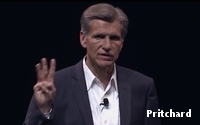
CANNES, FRANCE -- The world’s most powerful marketer pretty much summed up the underlying theme of this year’s
Lions Festival, and provided a framework for advertising’s new Golden Age of “ideas” with a new rule of three. “One, start with something true,” Marc Pritchard, Global
Brand Building Officer at Procter & Gamble, said during a keynote here on Friday. “Two, consider why anyone would care. I think the technical term for that is the ‘give-a-crap
factor.’ How can you tap into something that people really care about? Three, make your brand matter, because there’s no point in starting a conversation that your brand can’t be an
authentic part of.”
advertisement
advertisement
Pritchard articulated with his three simple rules what a wide range of speakers -- and attendees -- were saying
throughout the festival: That advertising has shifted from a world of gimmicks that prey on or hijack the attention of consumers to an art and craft that puts a premium on people’s time and
attention and offers them some value in return -- a reason to engage with a brand.
“There’s not enough ad dollars in the world to
pay your way into the promised land of the Golden Age of advertising: this new Golden Age of ideas,” he explained. “And simply mastering the tricks of the latest technology is not going to
get us there. The only way to get there is with creative ideas that are so insightful, so relevant and so big, they break out of the confines of the paid world and earn their way into people’s
hearts, minds and lives.”
Pritchard conceded that “ain’t easy,” but he at least simplified the goal and cut through
much of the noise and distraction surrounding the discussion -- like technology, data, misleading “native” advertising formats, and the ilk.
It was the same underlying theme expressed by other speakers throughout the festival -- from creative legends like BBH's Sir John Hegarty to WPP chief Sir Martin Sorrell to
rapper and media technology entrepreneur Kanye West: that brands, agencies and media need to have more respect for consumers' time and attention, and simply make them an offer they can’t
refuse.
In the case of Pritchard’s recommendations, they should be founded on solid insights about the consumer being targeted and should
be open, honest and transparent -- and most importantly, relevant -- to them.
“Nobody has the road map yet,” Pritchard acknowledge
to the festival’s delegates, “but I believe there are three fundamental guideposts that will help light the way to the new Golden Age of ideas.”